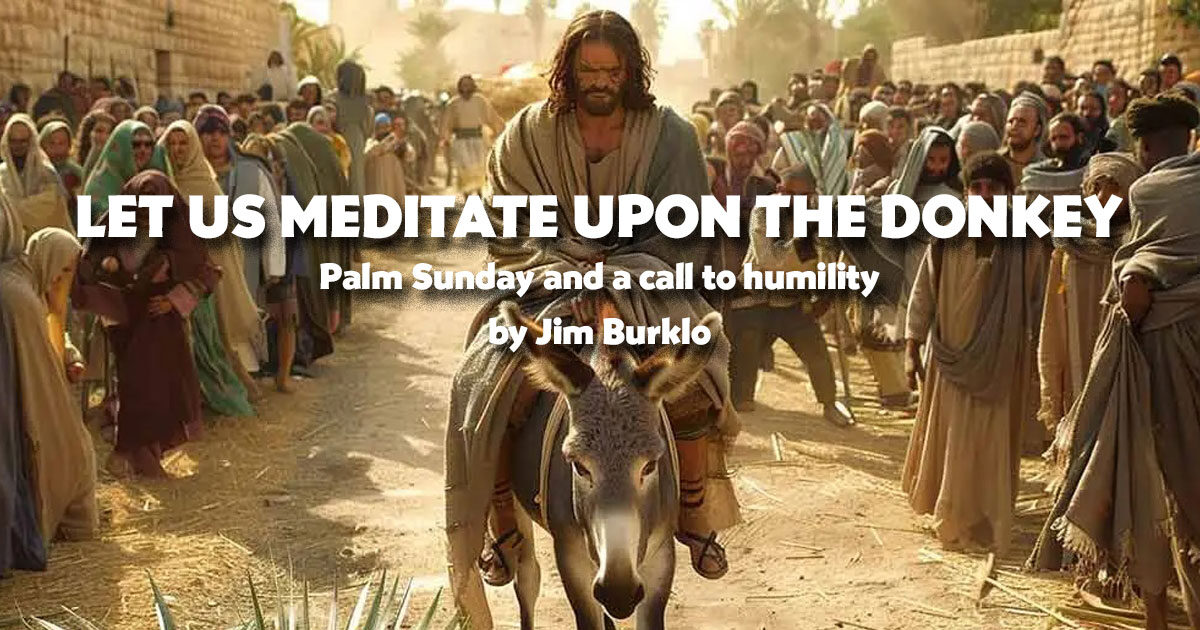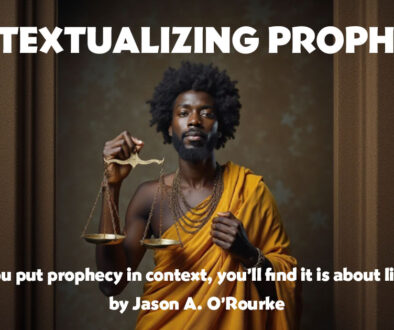Palm Sunday: Let Us Meditate Upon the Donkey
by Jim Burklo | 9 April 2025 |
It is the time of year when we remember Jesus entering Jerusalem for the last time, riding on a donkey with his admirers laying branches and fronds on the ground ahead of him to honor him. It is called, in most churches, Palm Sunday.
There is a profound irony in this story. We call it “the triumphal entry,” but it was nothing like the triumphal entry of a Roman emperor through the city gates with gleaming trumpets and grand horses and chariots and marching soldiers. Palm Sunday was a commoner riding on a donkey, with a retinue of other commoners in everyday garments walking with him.
“Look, your king is coming to you, humble, and mounted on a donkey, and on a colt, the foal of a donkey.” Matthew 21: 5 (Zechariah 9:9) What kind of king is this? It was a theater of the absurd.
And yet it is a story that speaks to and for our souls—especially now. Humility is in short supply in our country today. It is past time to live in it, and to expect our leaders to be led by it. For God’s sake!
The absence of humility in leadership results almost unfailingly in disaster. Believing you’re the smartest guy in the room, surrounding yourself only with sycophants who nod along and repeat your supposedly brilliant utterances, seldom ends well—as we can see today with pointless and cruel abuse of vulnerable immigrants and sexual minorities, a tumbling stock market, worsening inflation, and a government crippled by indiscriminate budget cuts.
William Penn, founder of Pennsylvania, is said to have said, “People must be ruled by God or they will be ruled by tyrants.” Jesus didn’t enter Jerusalem to take over the government of Israel. He didn’t enter Jerusalem to chase out the Romans. He entered Jerusalem to restore his people to their founding principle that set them apart from other nations: that they should be ruled only by God, and not by kings.
Now, of course, that is an idealistic principle. But ideals are very powerful motivators to get us to approximate them as best we can. Israel obeyed this principle more in the breach than in the practice, but nonetheless the principle lived in their hearts and remained in their sacred scriptures as their guiding light. The prophet Samuel warned the Israelites that their desire to be like other nations and have a king would not end well. He listed all the abuses and depredations they could expect if they had a king. The people still wanted a king, and they got one, and they suffered the consequences. But the ideal of having only God for their ruler lived on: the speech of Samuel survived in their scriptures. Unlike a certain somebody today, who aims to erase from our collective memory the parts of American history he doesn’t like, the Jewish people kept a record of their disastrous mistakes in their holy scripture, alongside the memory of their highest ideals. The Bible is a very powerful witness to the critical importance of staying awake to our history, with all its many warts and wrinkles, and not literally whitewashing it as is happening today.
Jesus showed up in Jerusalem on the back of a donkey as a visual reminder, lifting up that sacred intention of the Jewish people to be ruled by God and not by a tyrant. He showed up on the back of a donkey, not in a Tesla. He showed up on the back of a donkey, not in an armored limo in a motorcade.
Let us think for a moment of the donkey.
Surely the composers of the Gospels remembered another donkey in the scripture, in the story of the prophet Balaam. He was asked by the Moabites to curse the Israelites, who had amassed near the land of Moab. The Moabites were afraid that the Israelites would overwhelm them. So they sought this prophet from the east to come to Moab and cast a spell against the Israelites. After much persuading, he agreed to go, riding on the back of his donkey. From the book of Numbers, chapter 22:
The donkey saw the angel of the Lord standing in the road, with a drawn sword in his hand, so the donkey turned off the road and went into the field, and Balaam struck the donkey, to turn it back onto the road. Then the angel of the Lord stood in a narrow path between the vineyards, with a wall on either side. When the donkey saw the angel of the Lord, it scraped against the wall and scraped Balaam’s foot against the wall, so he struck it again. Then the angel of the Lord went ahead and stood in a narrow place, where there was no way to turn either to the right or to the left. When the donkey saw the angel of the Lord, it lay down under Balaam, and Balaam’s anger was kindled, and he struck the donkey with his staff. Then the Lord opened the mouth of the donkey, and it said to Balaam, “What have I done to you, that you have struck me these three times?” Balaam said to the donkey, “Because you have made a fool of me! I wish I had a sword in my hand! I would kill you right now!” But the donkey said to Balaam, “Am I not your donkey, which you have ridden all your life to this day? Have I been in the habit of treating you this way?” And he said, “No.” Then the Lord opened the eyes of Balaam, and he saw the angel of the Lord standing in the road, with his drawn sword in his hand, and he bowed down, falling on his face.
The donkey saw what Balaam could not see. The humble donkey had divine insight. The humble donkey humbled the proud prophet. And I’d like to think that the donkey’s lesson put Balaam in his place and made him more receptive to divine direction. Which is what Balaam went on to share with the Moabites, much to their chagrin.
The Moabites took Balaam to a high place where he could see the people of Israel camped on the land. He then shared with the Moabites the oracle he had received from God:
“How can I curse whom God has not cursed?
How can I denounce those whom the Lord has not denounced?…
a star shall come out of Jacob,
and a scepter shall rise out of Israel….
The Lord their God is with them,
acclaimed as a king among them.”
I like to think that the donkey opened Balaam’s eyes so that from the mountaintop he could see clearly what lay below him: a people ruled by God, not by a human king. A people not reckoning themselves among all the other nations who were ruled by tyrants. In his oracle he said “A star shall come out of Jacob, and a scepter shall rise out of Israel” – a line that Christians have suggested was a prophecy of the coming of the Christ. But it was no ordinary star, and no ordinary scepter. It was a commoner riding on a donkey, to remind the people of exactly what Balaam had said so long before: “The Lord their God is with them, acclaimed as a king among them.”
So when we lay out palm branches to welcome Jesus, we’re not hailing him as a temporal ruler. We’re welcoming the divine Ultimate Reality to whom Jesus gave allegiance. We’re welcoming God to lead us, to guide us. We are submitting ourselves to the rule of the law of Love, and to that Love alone. May this divine Love guide, sustain, and energize us into activism and resistance as we go through this very rough patch in the history of our people.
 Jim Burklo is an ordained United Church of Christ pastor. In 2022 he retired after 14 years as the Senior Associate Dean of Religious and Spiritual Life at the University of Southern California. He now serves as pastor of the United Church of Christ in Simi Valley, California. He also serves as executive director of Progressive Christians Uniting/ZOE: Progressive Christian Life on Campus, a national network of progressive Christian campus ministry groups. Jim is the author of seven published books on progressive faith: the latest is Tenderly Calling: An Invitation to the Way of Jesus (St Johann Press, 2021). His weekly blog, “Musings,” has a global audience. Jim and his wife, Roberta, live in Ojai, California.
Jim Burklo is an ordained United Church of Christ pastor. In 2022 he retired after 14 years as the Senior Associate Dean of Religious and Spiritual Life at the University of Southern California. He now serves as pastor of the United Church of Christ in Simi Valley, California. He also serves as executive director of Progressive Christians Uniting/ZOE: Progressive Christian Life on Campus, a national network of progressive Christian campus ministry groups. Jim is the author of seven published books on progressive faith: the latest is Tenderly Calling: An Invitation to the Way of Jesus (St Johann Press, 2021). His weekly blog, “Musings,” has a global audience. Jim and his wife, Roberta, live in Ojai, California.




